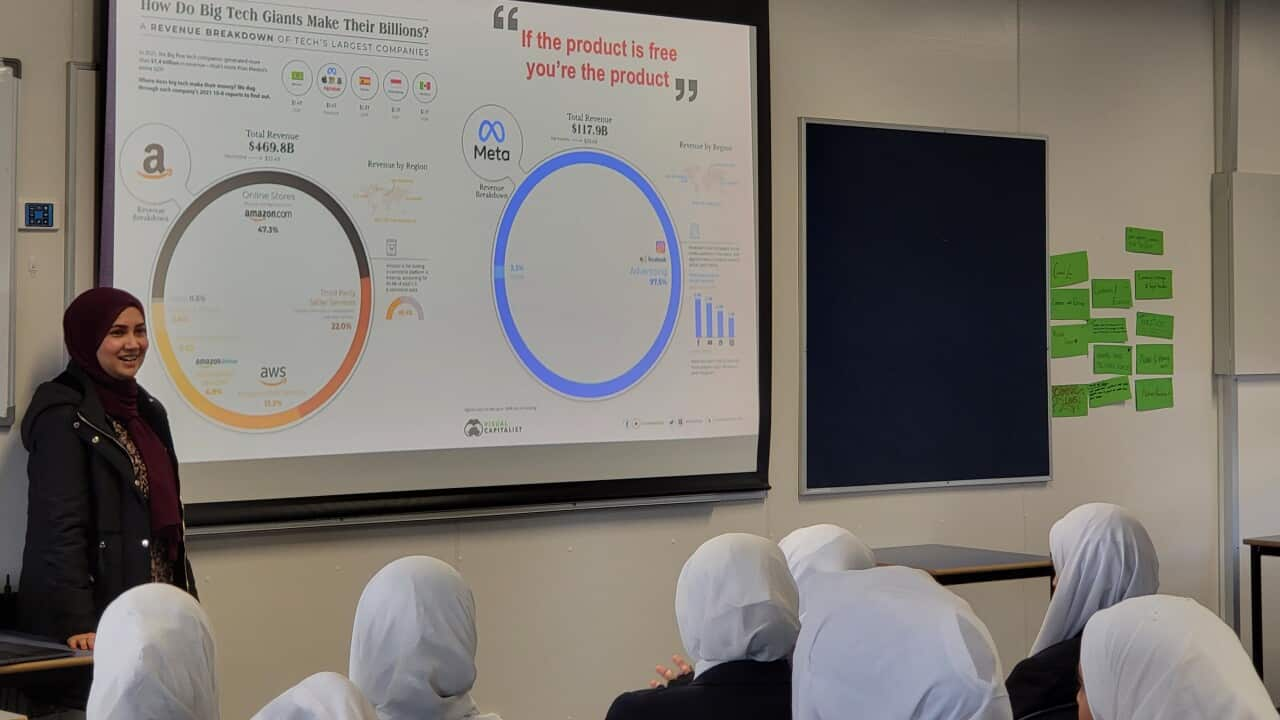Read about SBS' look at female scientists in the high school curriculum:
TRANSCRIPT:
BIWA KWAN:
Now Rashina you're one of those examples of the women in STEM that we want to be seeing and hearing more of. One of the issues tends to be a lot of girls don't really see themselves in STEM, and we've had that confirmed with some findings by a Curtin University academic who's surveyed the syllabus - I think it's the physics syllabus in 2018 - and she's found out of 150 entries there's 150 men mentioned and it was only one woman. And she's from the UK, British chemist Rosalind Franklin. And I just like to get your thoughts there on how do you react to that, that our Australian students aren't hearing about females in STEM?
RASHINA HODA:
Sad but not surprising. So this unfortunately continues to be a problem, whether it's in the curriculum at the school level or at the university level. One of the things that I'm trying to do, for example, I purposefully bring in that diversity when I'm talking about, say, the history of software engineering.
In fact, a lot of people don't know that the first ever person who coined the term software engineering was a woman. And that was Margaret Hamilton, who was leading the Apollo 11 team, and she was in charge of the software area. So these are little things that somehow get brushed over. And it takes somebody to actually take notice of that and to purposefully build that in. So people get a much more balanced and also honest kind of understanding of how science and technology has developed over the years.
BIWA KWAN:
Another finding of that survey of the syllabus is that many of the kind of discoveries that are focused on mainly tend to be European in focus. It doesn't really seem to be updated with what's happening in Australia, in Asia. What are your thoughts as to whether this surprises you as well?
RASHINA HODA:
Again, it's a little bit - you know, of course - unfortunate, but not surprising, because I think the first step to doing anything about this issue is awareness. We cannot be in denial about the fact that women are underrepresented. And when it comes to women who are culturally and linguistically diverse the numbers are even worse.
So one of the things I did was I wrote up an article reflecting on this issue and it's called Where are the Muslim girls and women in STEM. And this was published by Monash Lens. And it was a very kind of heartfelt article on what you know things mean to me professionally and personally, and how I wonder about these things as well, as just as you are, as where are these women, these culturally and linguistically diverse women? Because we know anecdotally - we know them, but when it comes to formal kind of acceptance and acknowledgment, they're nowhere to be seen.
BIWA KWAN:
In your own personal story, how did you first get in the STEM field? Fall in love? Where did that dream ignite for you?
RASHINA HODA:
Yeah, you talked about physics as part of that, the story that you are looking at with the curriculum. Physics was my first love into science. So I was absolutely adoring physics, the idea of understanding the world and the laws of motion, or was it no acceleration or torque, or how did things work. Right? So that was super fascinating to me. And I was always into that up until I actually got introduced to computer science. And then that was kind of, you know, my love for life. And this was around year eight, year nine.
And it was pretty much almost a chance encounter that there was this programming class offered, and I decided to just check it out. So I think we underestimate the power of these chance counters, and especially for women - because if somebody is not purposefully looking after this, then it's very easy to actually lose track of that.
So when I go out and do my outreach, and when I do interviews and panels, I always encourage girls to give STEM a shot. So you don't have to do it. But if you don't give it a shot, you will never know if this is the thing that you're going to love for your life. It's all about what you like doing, what you're good at doing and what you're going to be kind of doing for the rest of your life. Don't let anyone tell you what needs to be, what the stereotypes are behind what you can be. It's all about experimenting. It's all about exploring your interest, and then finding which is the one that is truly truly something you want to do for the rest of your life. So that can be arts, it can be science, it can be whatever - but don't let someone else decide that for you.













